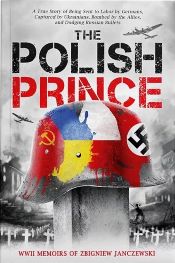The Polish Prince, set in eastern Poland, begins in 1939 when Janczewski is just 13 years old. It follows his life as he navigates the difficulties of surviving through WWII, from being captured and sent to work camps to his eventual escape. In spite of what he went through, Janczewski remained neutral. Ross remarked, “That’s, I guess, what makes the book special…he doesn’t pick on one side. So in the beginning of the war, he sees the Germans massacre even his friends. He sees that, first hand, and later in the war, he’s deported to Germany when the war is coming to an end, and he ends up having a German girlfriend who he cares for…” In addition, Janczewski also helped others during a time where he had access to food and many didn’t. He would sneak food to people at the risk of getting shot. From that experience, he learned, “I now see what bread could be for a man.”
What will Ross do with his great-grandfather’s story going forward? “…My end goal with this is it’s worth doing a documentary or movie about this…a documentary where you visit all of the places that he went… and then also an actual movie because I do believe it’s movie-worthy…That’s really the end goal, to make it into an actual movie and to just keep the story alive.”

That’s why this book is so timely… when [Janeczewski] talks in the end about this plague of nationalism, he talks about how it can spring up again…if these stories aren’t told…It’s this nationalistic tendency that’s happening.. with the war in Ukraine. The same atrocities are happening. It’s not like it’s completely different. It’s the same area of the world…but then again I feel like he…would see the humanity in both sides.


Since wars begin in the minds of men, it is in the minds of men that the defenses of peace must be constructed.

Podcast: Play in new window | Download
Subscribe: RSS

Want to join the discussion?
Feel free to contribute!